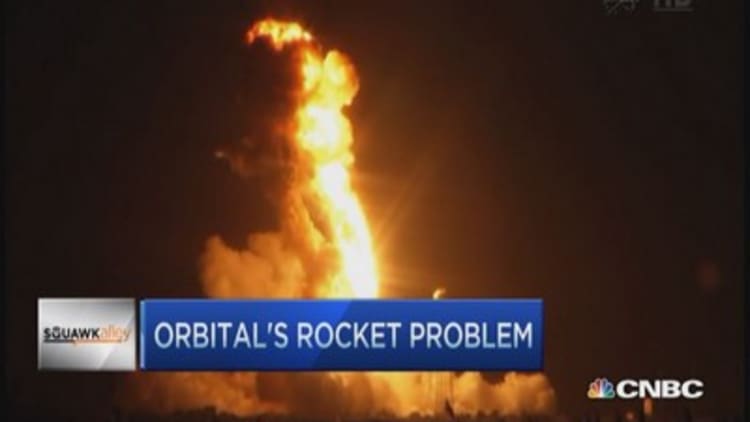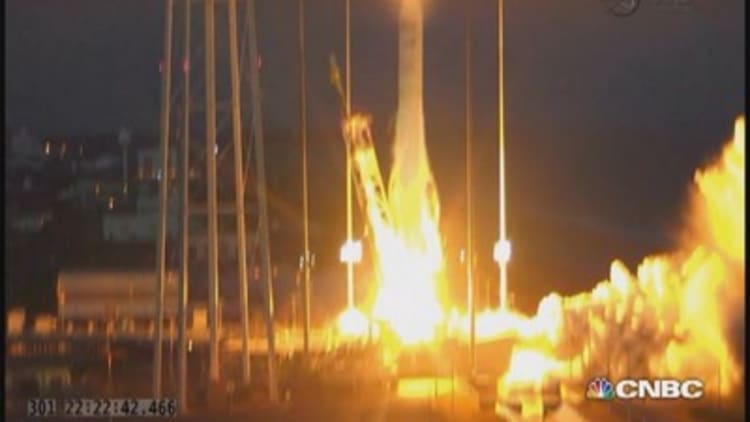
Americans might be surprised to learn that NASA didn't just hire one private contractor, SpaceX, to ferry supplies to the International Space Station. In fact, the space agency hired two. The second is Orbital Sciences, a 30-year-old successful rocket company now trying to regroup after Tuesday night's spectacular explosion on a launch pad in Virginia.
Like Elon Musk's SpaceX, Orbital Sciences contracts out space launch services, and both companies have been successful. That's where the similarities may end.
Unlike SpaceX, where Musk stages dramatic unveilings and makes headline grabbing pronouncements, Orbital Sciences is a quiet company formed in 1982 by three friends from Harvard Business School. It has built a reputation in both commercial satellite manufacturing and launch, as well as military missile tests, with over 500 missions and a total of 1,000 years of in-orbit operations. Orbital even scored a larger contract for fewer trips to the ISS than SpaceX did: $1.9 billion for eight trips, versus $1.6 billion awarded to SpaceX for 12.
Also unlike SpaceX, Orbital is a publicly traded company. Just two weeks ago, the company raised its full year guidance and expressed hope it would complete a merger with rocket rival ATK by the end of the year. However, as of midday Wednesday, shares were down more than 15 percent, wiping out nearly $300 million in market cap.
Read More Rocket explodes on launch
Because unlike SpaceX, Orbital Sciences has now had a failure to launch.

Orbital is investigating what went wrong Tuesday night, and all of its future NASA launches are on hold until it can determine the cause of the explosion. Was there a problem with the AJ-26 engine it uses in its Antares rocket, an older Russian engine refurbished by Aerojet-Rocketdyne, part of GenCorp? One AJ-26 exploded during a test last May. Could it be the newer, more powerful motor Orbital was using for the first time in its second stage? (Unlike SpaceX, the rocket Orbital Sciences uses isn't completely made in house.)
Two years ago in an interview with Wired Magazine, Musk was critical of Orbital's AJ-26 engine. "Their rocket honestly sounds like the punch line to a joke. It uses Russian rocket engines that were made in the '60s. I don't mean their design is from the '60s—I mean they start with engines that were literally made in the '60s."
Read More
Tuesday night, Musk was more subdued, tweeting:
While no SpaceX mission has failed yet, Musk's company did suffer an explosion earlier this year while testing a next generation rocket it's working on.
Finally, unlike SpaceX, Orbital Sciences was not chosen by NASA to develop a system to take astronauts to the space station. Orbital can only ferry cargo. For manned missions, Musk is facing off against Boeing to win the eventual contract. Boeing is a company with a far longer history in space and a much deeper relationship with NASA. Boeing uses Atlas rockets, which also have Russian-made engines. Newer ones. In fact, an Atlas V carrying a Boeing GPS satellite into orbit remain scheduled to launch Wednesday afternoon from Florida despite the explosion in Virginia.
"Launching rockets is an incredibly difficult undertaking," NASA said in a statement after Tuesday's night's explosion. "We learn from each success and each setback." And suddenly a lot of people are learning for the first time about a rocket company that has long been flying under the radar.


